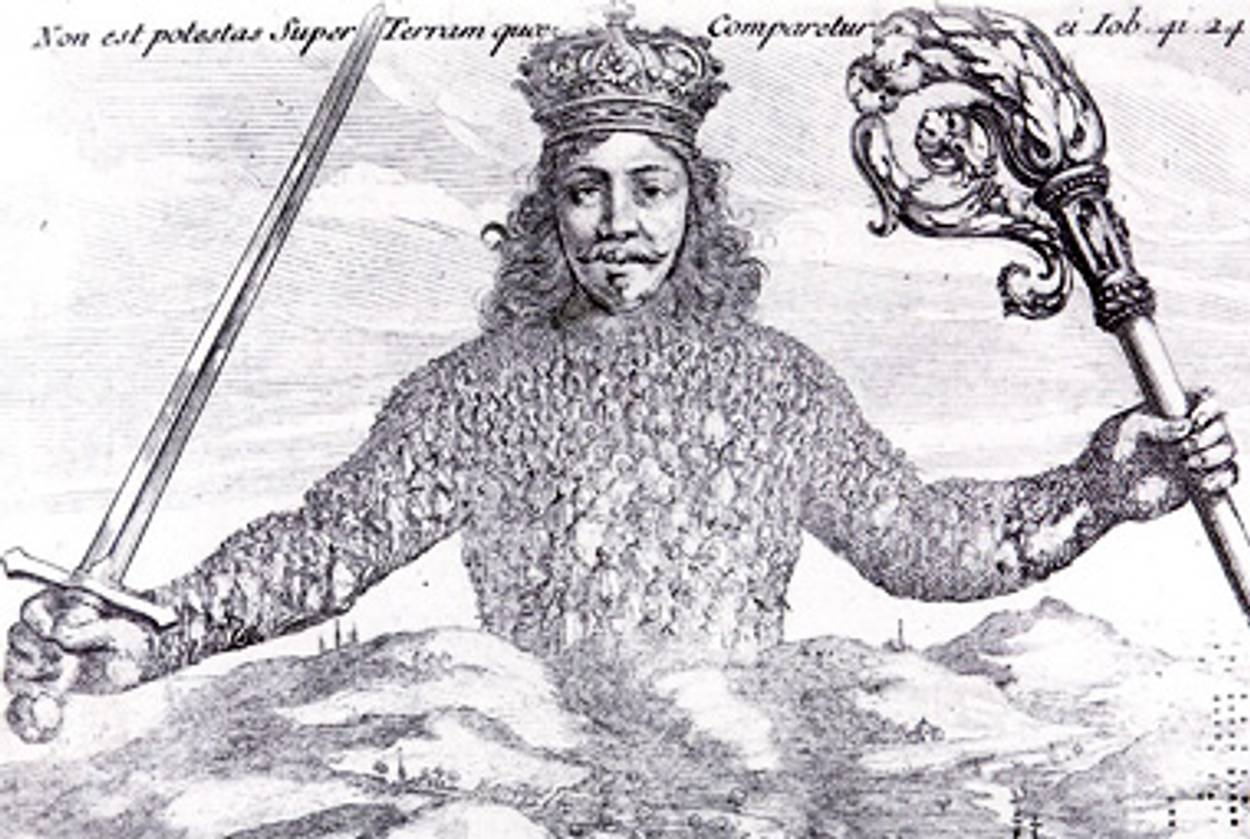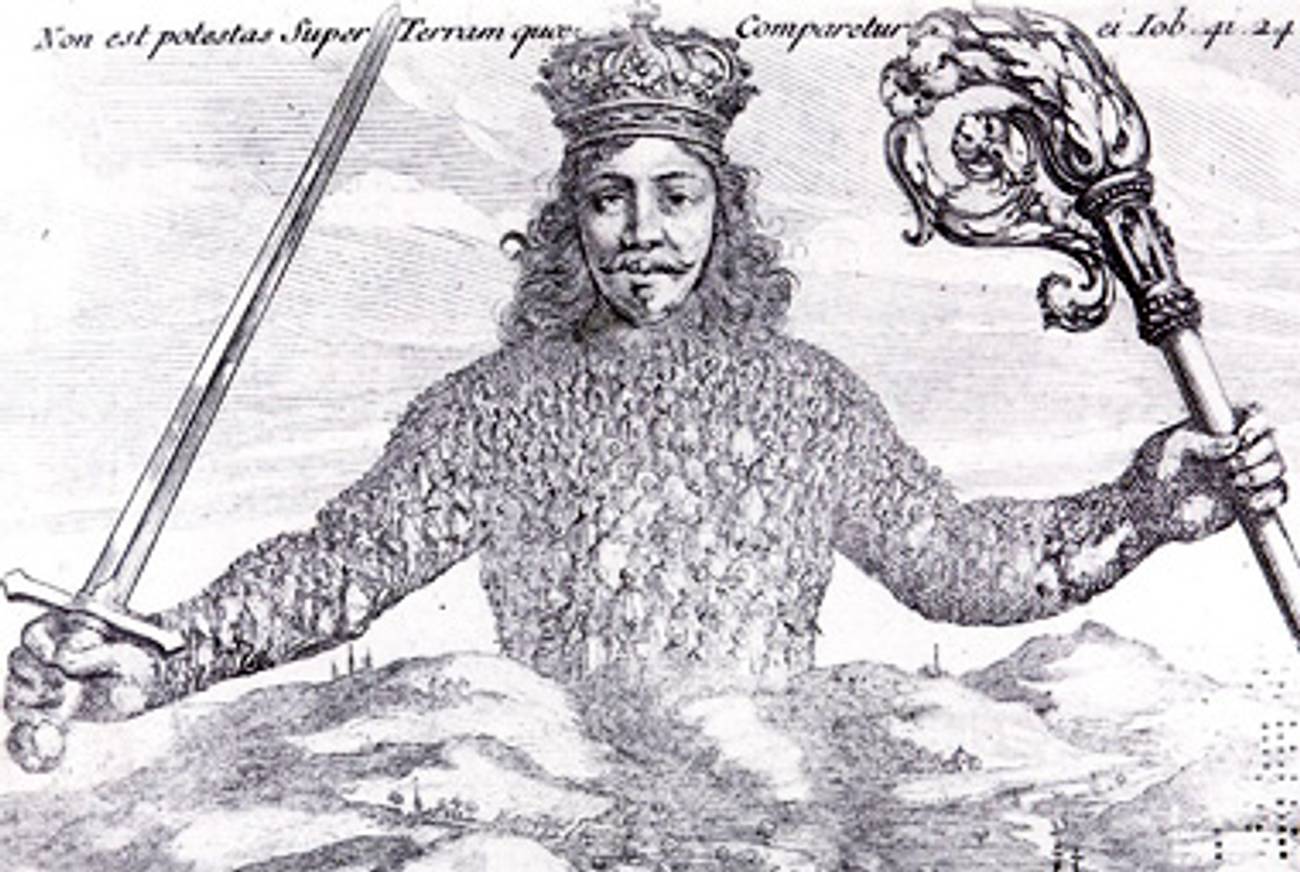Political Legacy
A new book examines the debt 17th-century republicanism owed to Jewish sources




The Hebrew Republic, Eric Nelson’s short but deeply learned and thought-provoking new book, sets out to resolve what looks like a strange historical paradox. Any standard textbook will tell you that 17th-century England was the birthplace of modern, liberal, secular ways of thinking about politics and government. At a time when England was convulsed by civil war, religious hatred, regicide, and revolution, philosophers like Thomas Hobbes and John Locke began to argue that the state should be considered as a purely human invention, whose purpose is not to follow God’s laws or promote the one true faith, but simply to secure peace and prosperity to its citizens. As Nelson summarizes this standard view, “the peculiar achievement of the seventeenth century [was] to have bequeathed us a tradition of political thought that has been purged of political theology.”
At the same time, however, the 17th century is also known, especially in England, as a time of intense religious passion and a new fascination with the Bible. As Nelson remarks, historians have called that period “the Biblical century,” and Hobbes and Locke both discuss the Bible in detail. The major reason for this new interest was, of course, the rise of Protestant Christianity, which taught that God’s will could be known only through the Bible and not through any church or priest. It became crucial, then, to read the Bible in its original form, undistorted by commentary and translation—that is, to read it in Hebrew.
As Nelson shows, it was not unheard of for Christians to study Hebrew before the 17th century. In particular, missionaries would “use Hebrew texts in order to refute Judaism and advance the cause of Jewish conversion.” But the 17th century saw what Nelson calls the “great flowering” of “Christian Hebraism,” as non-Jewish scholars began to study the Tanakh, and even the Talmud and rabbinic commentaries, at universities in Holland and England. The invention of printing, too, played an important role by giving non-Jews access to rabbinical texts for the first time. (The first printed Talmud was produced in 1520-23 by a Christian printer in Italy.)
Nelson argues that it was not a coincidence that Englishmen began to show an interest in republican government, redistribution of wealth, and religious toleration at just the same moment that they were learning more about Judaism than ever before. Rather, they were led to these new, seemingly secular ideas by their research into the laws and government of ancient Israel, as documented in the Bible and interpreted by the rabbis over centuries. “Christians began to regard the Hebrew Bible,” Nelson writes, “as a political constitution, designed by God himself for the children of Israel.” In a sense, then, traditional Jewish ideas—as interpreted, and misinterpreted, by Christian scholars—lie at the very origin of modern politics.
The Hebrew Republic traces a biblical and rabbinic genealogy for several important political concepts that, on their face, would seem to be strictly modern and secular. The first is what Nelson calls “republican exclusivism”—the idea that a republic, in which the people govern themselves, is the only valid form of government. Greek and Roman political theory always treated the republic as just one of several possible options for good government, alongside the equally legitimate monarchy and aristocracy. Why, in the 17th century, did Englishmen begin to argue that kings could never be acceptable rulers, that all sovereignty had to flow from the people?
The standard, secular explanation would turn to Hobbes and Locke, who thought of the state as the product of a social contract in which the people delegate their powers to a ruler for the common good. Nelson shows, however, that the debate on this subject in the 17th century revolved around the example of ancient Israel—in particular, on the passage in I Samuel when the Israelites demand that Samuel give them a king, “to judge us like all the nations.” When Samuel tells God about this, God is clearly displeased: “They have rejected me, that I should not reign over them.” Samuel goes on to list all the abuses a king will commit—from conscripting men into his army to seizing land and cattle for taxes—before giving in to the people’s request and anointing Saul.
Of course, Christian readers had always known about this passage. What changed during the “Hebrew Renaissance,” Nelson shows, was that they now had access to the debates about kingship in the Talmud and the commentaries. Particularly influential was the discussion of monarchy in Devarim Rabbah, a collection of midrashic commentaries on Deuteronomy translated into Latin in 1625. “The Rabbis say: God said unto Israel: ‘I planned that you should be free from kings,’ ” the midrash begins, going on to cite a wide variety of verses and commentators:
Rabbi Simon said in the name of Rabbi Joshua ben Levi: Whosoever puts his trust in the Holy One, blessed be He, is privileged to become like unto Him. Whence this? As it is said, “Blessed is the man that trusteth in the Lord, and whose trust the Lord is” (Jeremiah 17:7). But whosoever puts his trust in idolatry condemns himself to become like [the idols]. Whence this? As it is written, “They that make them shall be like unto them” (Psalms 115:8).
This midrash, Nelson shows through some impressive textual analysis (in Hebrew, Latin, and English), helped inspire English republicans to the radical new claim that kingship was inherently sinful, because it was a form of idolatry. It was cited by John Milton in his attack on the English monarchy, and it influenced several passages of Paradise Lost. Republican theorists like James Harrington and Algernon Sidney drew on the same rabbinic sources. Even Thomas Paine, defending the American Revolution in Common Sense, was echoing Devarim Rabbah.
Another key text in this debate was Deuteronomy 17:14, where Moses, looking forward to the time when the Israelites have conquered the land of Canaan, says: “When thou art come unto the land which the Lord thy God giveth thee … and shalt say, I will set a king over me, like as all the nations that are about me.” This, at least, is how the King James Bible translated it. But the Talmud records a debate about whether the Hebrew word “ve-amarta” should be understood as a description—“you will say”—or an imperative: “you shall say.” If the former, then Moses is simply predicting that the Israelites will demand a king; if the latter, he is ordering them to demand a king. Amazingly, Nelson shows, this Talmudic dispute became very well-known among English Christians, to the point that Harrington could refer to it knowingly in an anti-monarchist tract: “The one party will have the law to be positive, the other contingent and with a mark of detestation upon it.” Harrington even cites Gersonides and Maimonides in his discussion.
Nelson’s second and third chapters pursue a similar strategy, showing how Christian readings of Hebrew texts influenced other major political debates. Until the 17th century, even political thinkers who supported a republic had been absolutely opposed to the redistribution of wealth by the government. They were influenced in this, Nelson shows in another passage of wonderful scholarship, by their understanding of Roman history. According to ancient historians, the downfall of the Roman Republic had been caused by the introduction of a law that redistributed lands from wealthy aristocrats to the poor. The lex agraria, as the law was known, stood as a warning to future generations that the state must not be allowed to interfere with private property.
But the Hebraists, turning from Rome to Israel, noticed that the Biblical Jubilee—which held that every 50 years all land must be returned to its original owner—was itself a kind of lex agraria, designed to prevent any one person from amassing too much land. They pored over the minute explanations of the property code in the Talmud, especially in Maimonides’s Mishneh Torah. And they concluded that if the laws of Israel were given by God himself, then they must trump even the example of Rome; redistribution of wealth must be God’s will.
So, Harrington, in the imaginary model society he called Oceana, called for all estates beyond a certain size to be confiscated by the state. His reason, he explained, was that he was following “the fabric of the commonwealth of ancient Israel,” which was “made by an infallible legislator, even God himself.” As late as 1795, Nelson finds an American minister (Perez Fobes of Boston) sermonizing on “the wisdom of God in the appointment of a jubilee, as an essential article in the Jewish policy. This, it is probable, was the great palladium of liberty to that people.” Once again, a seemingly modern principle—redistribution of wealth by the government in the name of social equality—is shown to have Jewish roots.
It is possible that Nelson somewhat overstates the influence that these Jewish sources and examples had on 17th-century thinkers. Did modern thought about government really come from the Bible, or—as seems more plausible—did reformers like Harrington look to ancient Jewish sources to justify their modern ideas, borne of their experiences in war and revolution? As Nelson himself acknowledges, “the encounter between Protestant theorists and Hebrew sources did not take place in a vacuum.” No doubt specialists will be debating the arguments of The Hebrew Republic for some time to come—which is a testimony to Eric Nelson’s profound and original book.
Adam Kirsch is a poet and literary critic, whose books include The People and the Books: 18 Classics of Jewish Literature.
Adam Kirsch is a poet and literary critic, whose books include The People and the Books: 18 Classics of Jewish Literature.